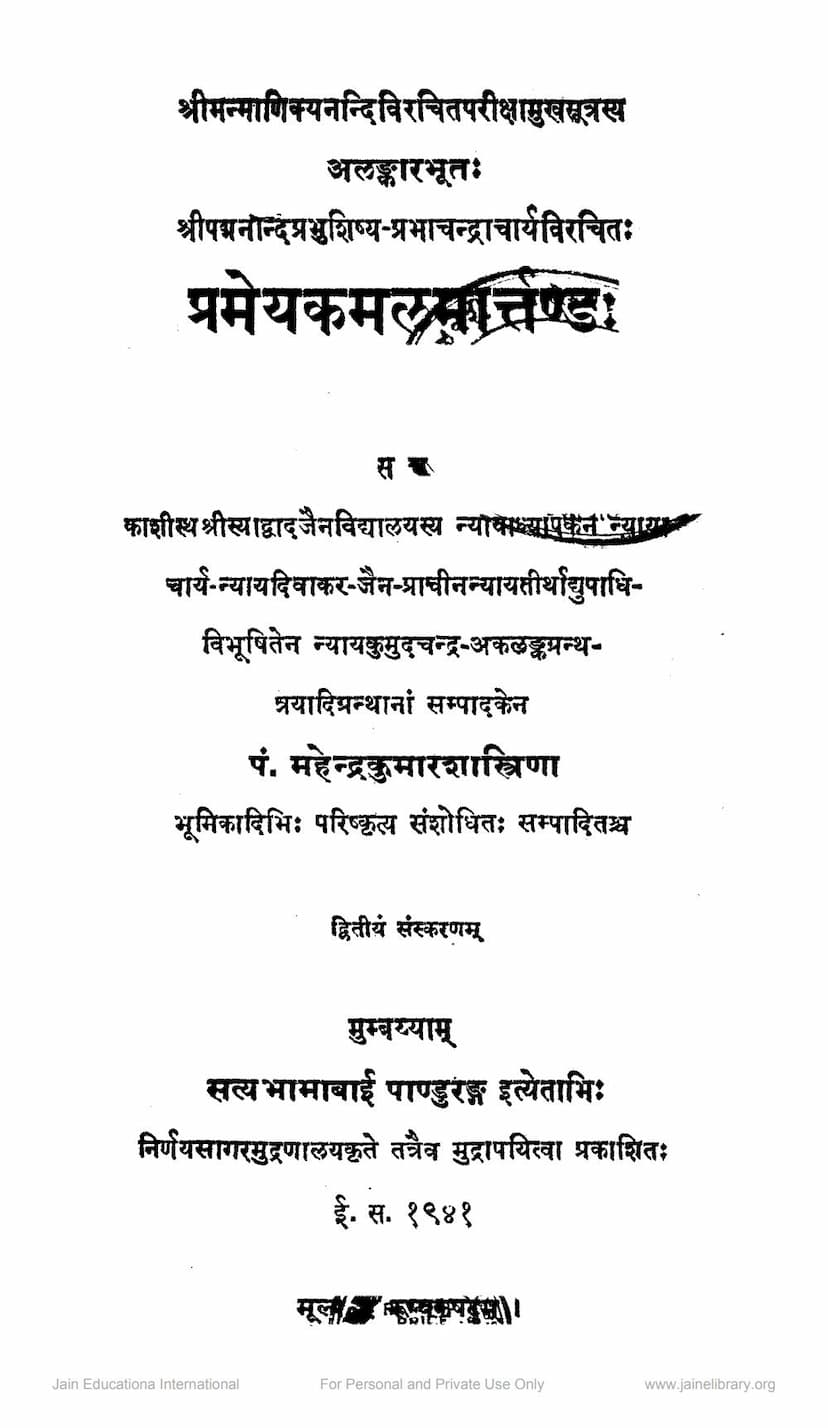Pramey Kamal Marttand
Added to library: September 2, 2025

Summary
Here is a comprehensive summary of the Jain text "Prameyakamala Marttand" by Mahendrakumar Shastri, based on the provided pages:
Book Title: Prameyakamala Marttand (प्रमेयकमलमार्त्तण्ड) Author: Shri Prabhachandra Acharya (श्रीप्रभाचन्द्राचार्य) Commentary on: Shri Manik Nandi's Pareeksha Mukh Sutra (श्री माणिक्यनन्दिविरचित परीक्षामुखसूत्र) Editor: Pt. Mahendra Kumar Shastri (पं. महेन्द्रकुमारशास्त्री) Publisher: Satyabhamabai Pandurang (सत्यभामाबाई पाण्डुरङ्ग) Publication Location: Bombay (मुम्बई) Year: 1941 (Second Edition)
Overall Summary:
"Prameyakamala Marttand" is a significant commentary by Acharya Prabhachandra on Manikyanandi's "Pareeksha Mukh Sutra," a foundational text in Jain logic and epistemology. The commentary is renowned for its depth, clarity, and analytical rigor. This particular edition, edited by Pt. Mahendra Kumar Shastri, is a revised and enriched second edition that aims to present the text accurately and make it accessible to a wider audience.
Key Aspects and Content:
-
Commentary on Manikyanandi: The primary purpose of "Prameyakamala Marttand" is to explain and elaborate on Manikyanandi's "Pareeksha Mukh Sutra." This sutra, considered the initial work in Jain logic, lays the groundwork for understanding valid knowledge (pramana) and the instruments of knowledge. Prabhachandra's commentary delves into each sutra, providing detailed explanations, arguments, and refutations.
-
Editor's Contribution (Pt. Mahendra Kumar Shastri): The second edition is a testament to the editor's meticulous work. Pt. Mahendra Kumar Shastri, a renowned scholar in Jain logic, undertook the task of re-editing the text. His contributions include:
- Introduction and Refinements: The edition is enhanced with an introduction, indexes, and other scholarly additions.
- Textual Purification: Efforts were made to correct textual inaccuracies found in the original printing, ensuring a more accurate representation of Prabhachandra's original work.
- Comparative Study: The edition includes a comparison of Manikyanandi's sutras with those of earlier and later scholars in both Jain and non-Jain philosophical traditions (e.g., Dignaga, Dharmakirti, Akalanka, Vādidevasūri, Hemachandra). This highlights the evolution and influences within Indian logic.
- Footnotes and Annotations: While the initial intention was to provide extensive comparative and explanatory annotations (similar to his work on "Nyaya Kumud Chandra"), practical constraints limited this to the first chapter. However, wherever possible, textual clarity and source references for quotations (avatar) were improved.
- Preservation of Originality: The editor consciously retained existing commentary from the first edition, even if it appeared scattered or inaccurate in places, with the aim of preserving the historical integrity of the original commentary.
-
Content of the Commentary:
- Structure: The work systematically elaborates on the principles of Jain logic, covering topics such as the nature of pramana (valid knowledge), its types, the means of acquiring knowledge, logical fallacies (hetvabhasas), and dialectics (vad).
- Engagement with Other Schools: Prabhachandra masterfully engages with and critiques the views of various other Indian philosophical schools, including Buddhism, Vedanta, Mimamsa, and Nyaya. This demonstrates a comprehensive understanding of the broader philosophical landscape and Prabhachandra's skill in establishing the supremacy of the Jain perspective.
- Key Concepts: The commentary likely explores:
- Pramana: The nature and validity of perception (pratyaksha), inference (anumana), scriptural testimony (agama), and other sources of knowledge.
- Hetvabhasas: Fallacious reasoning and how to identify and refute them.
- Syadvada: The Jain doctrine of conditioned predication, likely discussed in the context of refuting absolute claims of other schools.
- Saptabhangi: The sevenfold predictive framework, a core concept in Jain logic that allows for nuanced understanding of reality.
- Causality: Discussions on causation, the nature of reality, and the existence of an eternal soul (Atman) and its relationship with the material world are probable.
- Historical Context: The editor's introduction and the extensive discussion on Prabhachandra's time and influences place the work within its historical and intellectual context, highlighting its importance in the lineage of Indian philosophical thought.
-
Significance: "Prameyakamala Marttand" is considered a jewel in the crown of Jain logic. It not only provides an exhaustive explanation of Manikyanandi's work but also stands as an independent treatise on logic, valued for its philosophical insights and polemical skills. The editor's efforts in producing this second edition were crucial for its preservation and continued study.
In essence, "Prameyakamala Marttand" is a scholarly deep dive into Jain epistemology and logic, offering a rigorous examination of valid knowledge and reasoning, presented with historical context and textual accuracy by its dedicated editor.